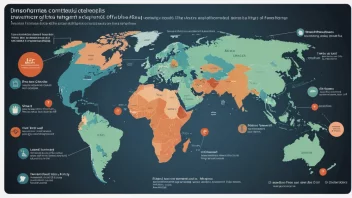As we approach 2024, governments around the world are confronted with a myriad of pressing policy issues that will shape the social, economic, and environmental landscapes for years to come. Among these issues, climate change and economic inequality stand out as two of the most critical challenges. This article compares these policy issues, examining their implications, pros and cons, and the approaches governments are taking to address them. While both issues are interconnected, they require distinct strategies and policies for effective resolution.
Understanding Climate Change
Climate change refers to significant and lasting changes in the Earth's climate, primarily driven by human activities such as fossil fuel combustion, deforestation, and industrial processes. The consequences of climate change are evident in rising global temperatures, extreme weather events, and loss of biodiversity.
Pros of Addressing Climate Change
- Environmental Preservation: Tackling climate change can help preserve ecosystems and biodiversity.
- Health Benefits: Reducing pollution from fossil fuels leads to improved public health outcomes.
- Economic Opportunities: The transition to renewable energy sources can create jobs and stimulate economic growth.
Cons of Addressing Climate Change
- High Costs: Implementing large-scale climate initiatives may require significant upfront investment.
- Political Resistance: Some stakeholders may oppose regulations that they perceive as harmful to their economic interests.
Understanding Economic Inequality
Economic inequality refers to the unequal distribution of wealth and resources among individuals or groups within a society. It is often measured using metrics such as income disparity and wealth concentration. In recent years, rising economic inequality has led to social unrest and calls for reform.
Pros of Addressing Economic Inequality
- Social Stability: Reducing inequality can lead to a more stable and cohesive society.
- Enhanced Economic Growth: Addressing inequality can boost consumer spending and economic demand.
- Improved Quality of Life: Policies aimed at reducing inequality can enhance access to education, healthcare, and opportunities for marginalized groups.
Cons of Addressing Economic Inequality
- Resistance from Wealthy Elites: Those at the top of the economic ladder may resist changes that threaten their wealth.
- Implementation Challenges: Creating effective policies to redistribute wealth can be politically and logistically complex.
Comparative Analysis
Both climate change and economic inequality present significant challenges for governments, but they do so in different ways. Climate change is primarily an environmental issue, with consequences that affect global ecosystems and public health. Conversely, economic inequality is a social issue that impacts the fabric of society, leading to divisions and unrest.
Interconnection of Issues
While these issues may seem distinct, they are interconnected. Climate change disproportionately affects lower-income populations, who often lack the resources to adapt to its impacts. Furthermore, policies aimed at addressing climate change can also exacerbate economic inequality if not designed thoughtfully. For example, the transition to green technologies must ensure that workers in fossil fuel industries are retrained and supported.
Government Approaches
In 2024, various governments are adopting different approaches to tackle these challenges:
- Climate Policies: Many countries are implementing carbon pricing, investing in renewable energy, and committing to international agreements like the Paris Accord.
- Economic Policies: Governments are exploring progressive taxation, social safety nets, and policies aimed at increasing access to education and healthcare.
Conclusion
As we look towards 2024, climate change and economic inequality remain at the forefront of policy discussions. While addressing both issues is critical for sustainable development, it is essential that policymakers recognize their interconnectedness and design strategies that promote equity and environmental stewardship. Ultimately, a holistic approach that integrates climate action with social equity will be vital in creating a more just and sustainable future.






